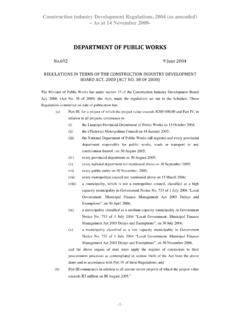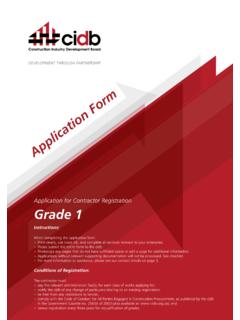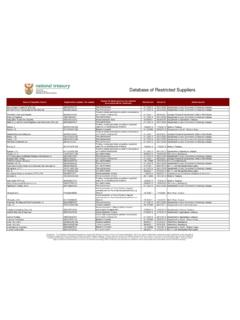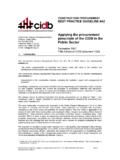Transcription of The procurement of professional services - CIDB
1 Best Practice Guideline A7: procurement of professional services Page 1 December 2007: Edition 2 of CIDB document 1035 1. Introduction professional service providers within the built environment represent one of the major pools of skilled technical resources in the country that are used to ensure that technical designs and engineering and construction works are of good quality and are cost-effective. Good quality engineering and infrastructure development is essential to the country s growth and development and hence these skilled resources also play an important role in ensuring that the country remains technically competitive from a global perspective. At the same time, The Policy Strategy to Guide Uniformity in procurement Reform Processes in Government issued by the National Treasury contains four high level objectives, one of which is to replace the outdated procurement and provisioning practices in government with a supply chain management function and a systematic competitive procedure for the appointment of consultants.
2 This policy strategy document also recognizes that it is necessary that certain minimum requirements of quality and efficiency be achieved when appointing consultants . Accordingly, the processes of procuring services in the construction industry need to maintain a balance between reasonable compensation that will ensure the continued attractiveness and development of these professions on the one hand, and ensuring competitiveness on the other hand. professional service providers may be appointed for a wide variety of tasks ranging from providing advice on issues such as policies and standards, through investigations and surveys, to planning, conceiving and designing construction works.
3 They may also be appointed to manage and monitor construction works as well as operations and maintenance. In most cases the downstream impact of the service, for example the capital cost as well as the operations and maintenance cost over the lifetime of a facility, will depend on how well these professionals carry out their work. These services all have to be provided while ensuring the safety, well being and comfort of the public using the facility. Therefore, these professionals have obligations to both the public and their clients and this requires effective communication and a relationship of mutual respect and trust between the client and the service provider to ensure success.
4 It is for these reasons that section of the Treasury policy strategy document states that technical quality and independence of advice are key considerations in engaging consultants and that the client should benefit from (the consultants ) superior knowledge, transfer of skills and upgrading of a knowledge base while executing an assignment. This is followed by statements relating to the independence of advice; Obtaining advice that is unbiased, that is, being delivered by a consultant acting independently from any affiliation, economic or otherwise, which may cause conflicts between the consultant s interests and those of government; and Ensuring the advice proposed, or assignment executed, meets the ethical principles of the consultancy professions.
5 2. Historical practices for procuring professional services in south Africa Government and professional associations in South Africa have historically published time based fee scales and percentage fee scales relating to commonly encountered scopes of work for professional CONSTRUCTION procurement BEST PRACTICE GUIDELINE #A7 The procurement of professional services December 2007 Second edition of CIDB document 1035 Construction Industry Development Board Pretoria - Head OfficeTel: 012 482 7200 Fraudline: 0800 11 24 32 Call Centre: 0860 103 353 E-mail: Best Practice Guideline A7: procurement of professional services Page 2 December 2007: Edition 2 of CIDB document 1035 services in respect of the various built environment disciplines.
6 This has allowed appointments to be made to consultants on a prescribed fee (tariff) basis without providing a detailed scope of work. For example, a consultant can be appointed to undertake a feasibility study for a project and proceed from one stage of the project to the other as it develops, as the fee is based on a percentage of the construction works. The manner in which services have been procured from professionals in the built environment over the last decade in South Africa varies considerably. Consultants have been appointed from panels (a data base of pre-qualified consultants) on a tariff basis ( in terms of a scale of fees or standard hourly fees) either in the sequence that they are registered on the database or at the discretion of officials.
7 Alternatively, two or three firms that are on an organization s panel are invited to submit proposals and the appointment is made on a tariff basis. Non-tariff based appointments have also been made using a number of methods including open tendering or inviting tenders from a short list of pre-qualified consultants, or from those registered on a data base. Few organs of state invite open tenders for professional services relating to routine professional services that fall within the scope of guideline tariffs. Tenders are usually only invited where the scope of work is substantial or falls outside of the guideline tariffs, eg major projects, programme management services , policy development and training.
8 In some instances, consultants apply for funds and execute work on a risk basis and when money is made available, they are granted appointments. Tenders are also sometimes invited and awarded on price alone. Some departments have developed computer based software for the selection of consultants in respect of both tariff and non-tariff based appointments, subject to the estimated value of such contracts being less than a threshold value. Managers requiring professional services complete request forms, stating the value, location and service categories that they require. Consultants that satisfy the search criteria are awarded contracts or invited to submit tenders / proposals by the electronic processing of such requests, depending upon their position on the database.
9 Consultants, upon appointment or submission of a tender / proposal are moved to a new position on the database. 3. Tariff of fees in respect of the various built environment councils The Councils for the various built environment professions are empowered through their respective pieces of legislation to publish in the Gazette on an annual basis, after consultation with the voluntary associations, representatives of service providers and clients in the public and private sector, guideline professional fees. The Engineering Council of South Africa, for example, publishes the following two documents in this regard: Guideline Scope of services and Tariff of Fees for Persons Registered in terms of the Engineering Profession Act, 2000; and Indicative Time Based Fee Rates professional bodies such as the South African Association of Consulting Engineers no longer issue tariffs of fees following actions taken against professional associations in other professions by the Competitions Commission.
10 4. Legislative requirements for the procurement of professional services Treasury Regulation (g) for departments, trading entities, constitutional institutions and public entities issued in terms of the Public Finance Management Act (Act 1 of 1999) states that: The accounting officer or accounting authority must ensure that instructions issued by the National Treasury in respect of the appointment of consultants are complied with. The Supply Chain Management Regulations issued in terms of the Municipal Finance Management Act (Act 56 of 2003) states that: Best Practice Guideline A7: procurement of professional services Page 3 December 2007: Edition 2 of CIDB document 1035 35 (1) A supply chain management policy may allow the accounting officer to procure consulting services provided that any Treasury guidelines in respect of consulting services are taken into account when such procurement are made.













